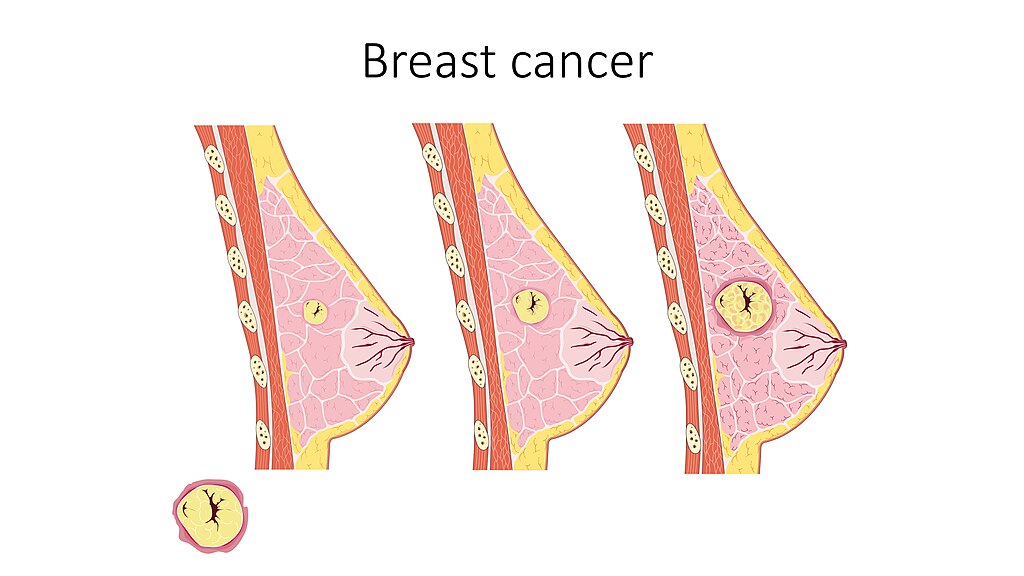Topics
1.5.1 Lump in the Breast
1.5.2 What Happens Next?
1.5.3 Upholding Rights
1.5.4 Getting Support
1.5.5 Telling Loved Ones
1.5.6 Questions to Ask at the Diagnosis
Chapter 1: Assessment
Learning Objectives
➤ Explain what a lump in the breast could be.
➤ Explain what happens next after a breast cancer diagnosis.
➤ List the types of support needed after a diagnosis.
➤ List the questions to ask at the time of diagnosis.
1.5.1 Lump in the Breast
If you find a lump in your breast, do not panic. A lump can be from the hormones your body produces during your menstrual cycle or be a benign cyst; neither of these lumps is cancerous (Canadian Breast Cancer Network [CBCN], 2022). However, it is still important to contact your health provider about the lump so they can do a clinical breast examination.
See Image 7 for an illustration of how a breast cancer lump develops (Laboratoires Servier, 2019).
Image 7: Progression of breast cancer

(Laboratoires Servier / Wikimedia Commons) CC BY-SA
1.5.2 What Happens Next?
If you are diagnosed with breast cancer, you will receive further testing that will help to determine the stage and grade of cancer. This testing will allow your healthcare team to make informed decisions about treatment plans (CBCN, 2022).
1.5.3 Upholding Rights
As you decide how you want to treat your breast cancer, remember one crucial message: it is your body.
You control how your treatment will play out (CBCN, 2022). You have the right to refuse care, accept different treatments, ask for a different physician, and other similar rights. You can either make all the decisions for your treatment or leave some to your healthcare team’s discretion.
If you are uncomfortable with your treatment’s progress, you have the right to seek alternative care (CBCN, 2022). Even though this is an uncomfortable situation, be straightforward with your healthcare team. Your healthcare team wants to put you at the center of care and would not want you to feel uncertain about your treatment plan. Talking openly about your wants and wishes is how to create a healthy relationship with your healthcare team.
1.5.4 Getting Support
During your breast cancer journey, you should have access to support if you need it. Communicating with others about your feelings, treatments, concerns, and anything else can help you.
In your personal life, you can talk to family, friends, neighbors, your healthcare team, and anyone else you trust.
Breast cancer support groups can also be a good resource. Talking to others with similar lived experiences can help you feel less alone and potentially receive guidance for your own journey.
Community resources are also available for you to use. For example, in British Columbia, you can call 8-1-1 for more information on how to manage the various aspects of your breast cancer (HealthLink BC, 2017).
Reaching out for support may be difficult for you if you are not used to being the one who requires support or help; however, remember that one cannot do everything alone. There will be a time when you require the help and support of those around you. Accepting this help and support will help you immensely as you navigate your breast cancer journey.
1.5.5 Telling Loved Ones
Telling your family and friends is something that you will have to do eventually during your breast cancer journey. It is important to tell your loved ones about the diagnosis when you are ready.
Talking to loved ones about cancer will be difficult; however, that does not mean it is not beneficial for you (Canadian Cancer Society, n.d.16). Figuring out how to tell your loved ones can help you to process and understand your emotions. Not only that, but it can help to have someone who listens.
Additionally, informing your family and friends will help them fully understand the situation. If they know what is happening to you, they can more easily give you their support (Canadian Cancer Society, n.d.16).
You do not have to tell everyone simultaneously or in person (Canadian Cancer Society, n.d.16). Sometimes, you may find that a phone call is easier for you.
Furthermore, you can tell them as little or as much information as you are comfortable with (Canadian Cancer Society, n.d.16). Some people tell their loved ones their feelings, while others disclose more details.
For more information about coping with your breast cancer diagnosis, check out Video 8 (Canadian Cancer Society, 2017).
Video 8
Cancer Basics – Coping when you’re first diagnosed with cancer (Canadian Cancer Society, 2017).
1.5.6 Questions to Ask About Your Diagnosis
- What does my diagnosis mean?
- Why is grading and staging my cancer important?
- What grade and stage is my tumour at? What does that mean?
- What are my treatment options?
- Who will oversee the creation of my treatment plan?
- Is there any additional diagnostic testing? Which ones?
- Is there any cost associated with the diagnostic testing?
- How soon will I have the results of my diagnostic testing? (Lymphedema Working Group, 2012)